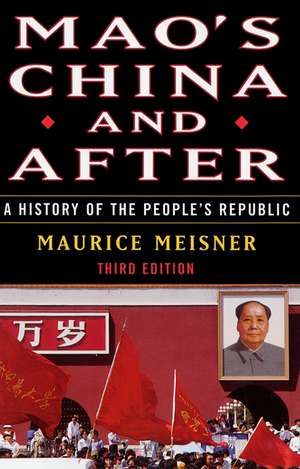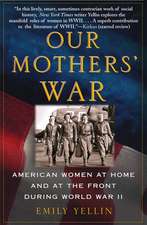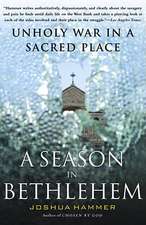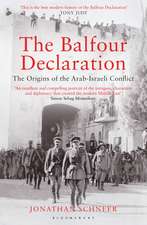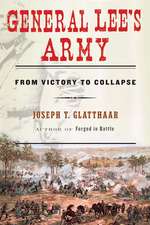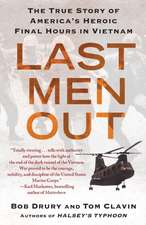Mao's China and After: A History of the People's Republic, Third Edition
Autor Maurice Meisneren Limba Engleză Hardback – 6 iul 1999
Preț: 256.04 lei
Nou
Puncte Express: 384
Preț estimativ în valută:
48.99€ • 51.16$ • 40.46£
48.99€ • 51.16$ • 40.46£
Carte tipărită la comandă
Livrare economică 15-29 aprilie
Preluare comenzi: 021 569.72.76
Specificații
ISBN-13: 9780684856353
ISBN-10: 0684856352
Pagini: 608
Dimensiuni: 156 x 235 x 38 mm
Greutate: 0.89 kg
Ediția:Revised
Editura: Free Press
Colecția Free Press
Locul publicării:United States
ISBN-10: 0684856352
Pagini: 608
Dimensiuni: 156 x 235 x 38 mm
Greutate: 0.89 kg
Ediția:Revised
Editura: Free Press
Colecția Free Press
Locul publicării:United States
Notă biografică
Maurice Meisner is the Harvey Goldberg Professor of History at the University of Wisconsin-Madison and the Visiting Centennial Professor at the London School of Economics. His writings, which have been translated into Chinese, Korean, Japanese, French, German, Spanish, and Portuguese, include Li Ta-chao and the Origins of Chinese Marxism; Marxism, Maoism and Utopianism; and many other works on modern Chinese history.
Cuprins
Contents
Preface to the Third Edition
PART ONE: THE REVOLUTIONARY HERITAGE
1. Western Imperialism and the Weakness of Chinese Social Classes
2. The Defection of the Intellectuals
3. The Abortiveness of Bourgeois and Proletarian Revolution
4. The Maoist Revolution and the Yan'an Legacy
PART TWO: THE NEW ORDER, 1949-1955
5. The New State
6. The Cities: The Rise and Fall of National Capitalism
7. Land Reform: The Bourgeois Revolution in the Countryside
8. The Social and Political Consequences of Industrialization
9. Agricultural Collectivization, 1953-1957
PART THREE: UTOPIANISM, 1956-1960
10. The Hundred Flowers: Socialism, Bureaucracy, and Freedom
11. Permanent Revolution: The Ideological Origins of the Great Leap
12. Economics of the Great Leap Forward
13. The People's Communes and the "Transition to Communism": 1958-1960
PART FOUR: THE THERMIDORIAN REACTION, 1960-1965
14. The Bureaucratic Restoration
15. The New Economic Policy, 1961-1965
16. The Socialist Education Movement, 1962-1965
PART FIVE: THE CULTURAL REVOLUTION. AND ITS AFTERMATH, 1966-1976
17. The Concept of Cultural Revolution
18. The Great Proletarian Cultural Revolution, 1966-1969
19. Social Results of the Cultural Revolution
20. The Aftermath of the Cultural Revolution and the Close of the Maoist Era, 1969-1976
PART SIX: DENG XIAOPING AND THE ORIGINS OF CHINESE CAPITALISM, 1976-1998
21. The Legacies of the Maoist Era
22. The Rise of Deng Xiaoping and the Critique of Maoism
23. Market Reforms and the Development of Capitalism
24. The Struggle for Democracy
25. The End of the Reign of Deng Xiaoping: China in the 1990s
Selected Bibliography
Index
Preface to the Third Edition
PART ONE: THE REVOLUTIONARY HERITAGE
1. Western Imperialism and the Weakness of Chinese Social Classes
2. The Defection of the Intellectuals
3. The Abortiveness of Bourgeois and Proletarian Revolution
4. The Maoist Revolution and the Yan'an Legacy
PART TWO: THE NEW ORDER, 1949-1955
5. The New State
6. The Cities: The Rise and Fall of National Capitalism
7. Land Reform: The Bourgeois Revolution in the Countryside
8. The Social and Political Consequences of Industrialization
9. Agricultural Collectivization, 1953-1957
PART THREE: UTOPIANISM, 1956-1960
10. The Hundred Flowers: Socialism, Bureaucracy, and Freedom
11. Permanent Revolution: The Ideological Origins of the Great Leap
12. Economics of the Great Leap Forward
13. The People's Communes and the "Transition to Communism": 1958-1960
PART FOUR: THE THERMIDORIAN REACTION, 1960-1965
14. The Bureaucratic Restoration
15. The New Economic Policy, 1961-1965
16. The Socialist Education Movement, 1962-1965
PART FIVE: THE CULTURAL REVOLUTION. AND ITS AFTERMATH, 1966-1976
17. The Concept of Cultural Revolution
18. The Great Proletarian Cultural Revolution, 1966-1969
19. Social Results of the Cultural Revolution
20. The Aftermath of the Cultural Revolution and the Close of the Maoist Era, 1969-1976
PART SIX: DENG XIAOPING AND THE ORIGINS OF CHINESE CAPITALISM, 1976-1998
21. The Legacies of the Maoist Era
22. The Rise of Deng Xiaoping and the Critique of Maoism
23. Market Reforms and the Development of Capitalism
24. The Struggle for Democracy
25. The End of the Reign of Deng Xiaoping: China in the 1990s
Selected Bibliography
Index
Recenzii
Foreign Affairs Of the thousands of books that have been written about contemporary China, only a few will stand the test of time. This is one of them.
William W. Finan, Jr. Editor, Current History With this new edition, Maurice Meisner deftly places the "new" China that so captivates the West into the historical stream of policies, politics, and personalities that have ruled the country since Mao's 1949 revolution. His work is a refreshingly clear exposition of the contradictions and continuities that define China today.
Zhiyuan Cui Professor of Political Science, MIT Splendidly relates the human drama of the Chinese people and their leaders, with empathetic understanding and constructive criticism.
Lin Chun London School of Economics One of the foremost historians of our time, Professor Meisner offers a brilliant analysis in this new edition of the irony of Chinese socialism and of the origins of Chinese capitalism: the single most important theme in an age of catastrophic "transitions," with implications that go far beyond the border of the PRC.
William A. Joseph Chair, Department of Political Science, Wellesley College A superb and much-needed updating of a book that has been the definitive text on the history of the People's Republic of China....A deeply thoughtful and thought-provoking account of the socioeconomic, political, and ideological consequences of China's move toward the market in the post-Mao era....enriching and enthralling.
Marilyn B. Young Professor, History, New York University An excellent expansion of the original.
William W. Finan, Jr. Editor, Current History With this new edition, Maurice Meisner deftly places the "new" China that so captivates the West into the historical stream of policies, politics, and personalities that have ruled the country since Mao's 1949 revolution. His work is a refreshingly clear exposition of the contradictions and continuities that define China today.
Zhiyuan Cui Professor of Political Science, MIT Splendidly relates the human drama of the Chinese people and their leaders, with empathetic understanding and constructive criticism.
Lin Chun London School of Economics One of the foremost historians of our time, Professor Meisner offers a brilliant analysis in this new edition of the irony of Chinese socialism and of the origins of Chinese capitalism: the single most important theme in an age of catastrophic "transitions," with implications that go far beyond the border of the PRC.
William A. Joseph Chair, Department of Political Science, Wellesley College A superb and much-needed updating of a book that has been the definitive text on the history of the People's Republic of China....A deeply thoughtful and thought-provoking account of the socioeconomic, political, and ideological consequences of China's move toward the market in the post-Mao era....enriching and enthralling.
Marilyn B. Young Professor, History, New York University An excellent expansion of the original.
Descriere
In this much anticipated revision, Maurice Meisner again provides piercing insight and comprehensive coverage of China's fascinating and turbulent modern history.
